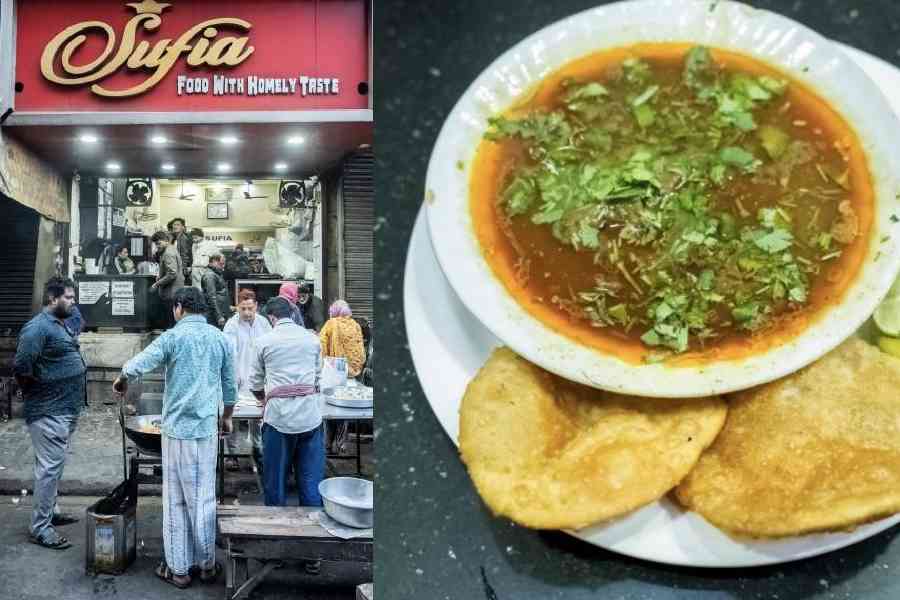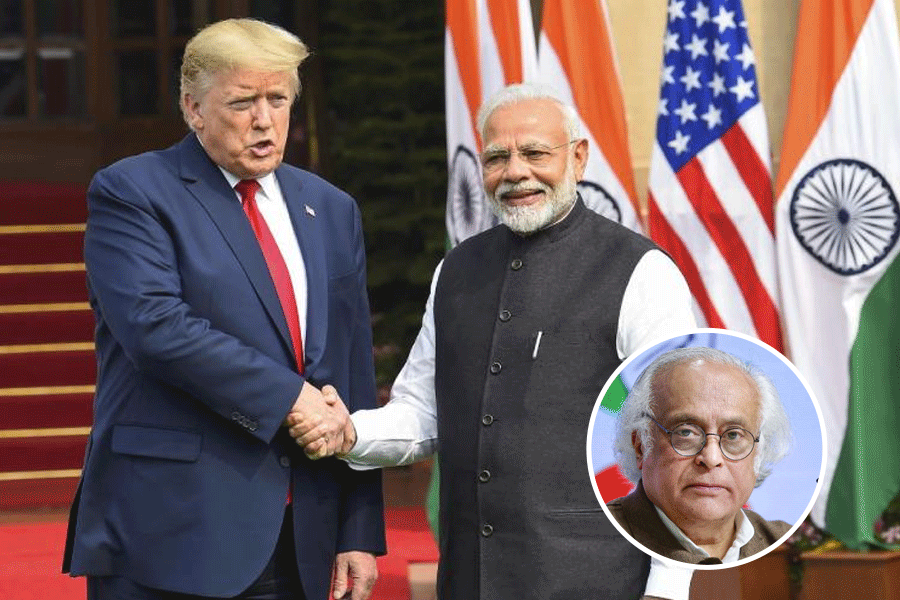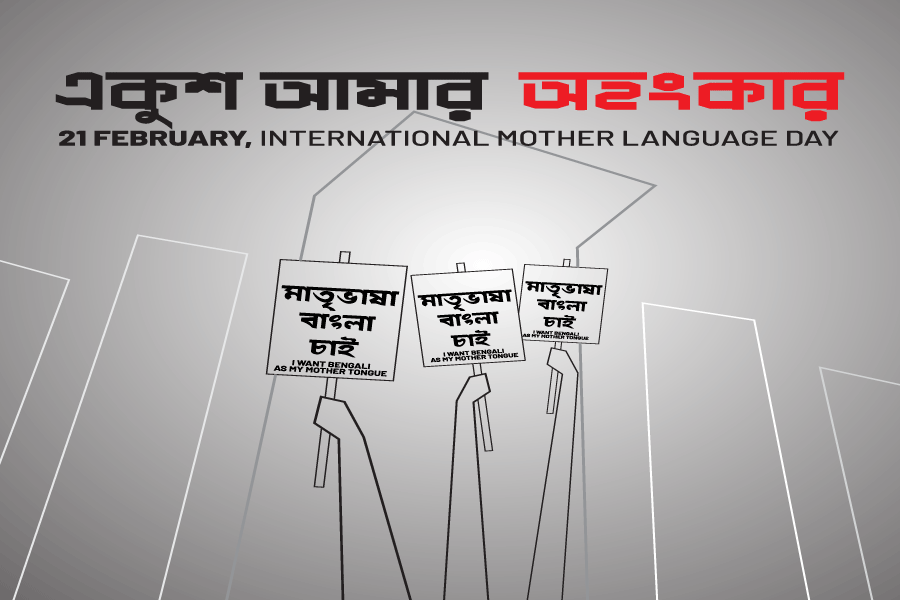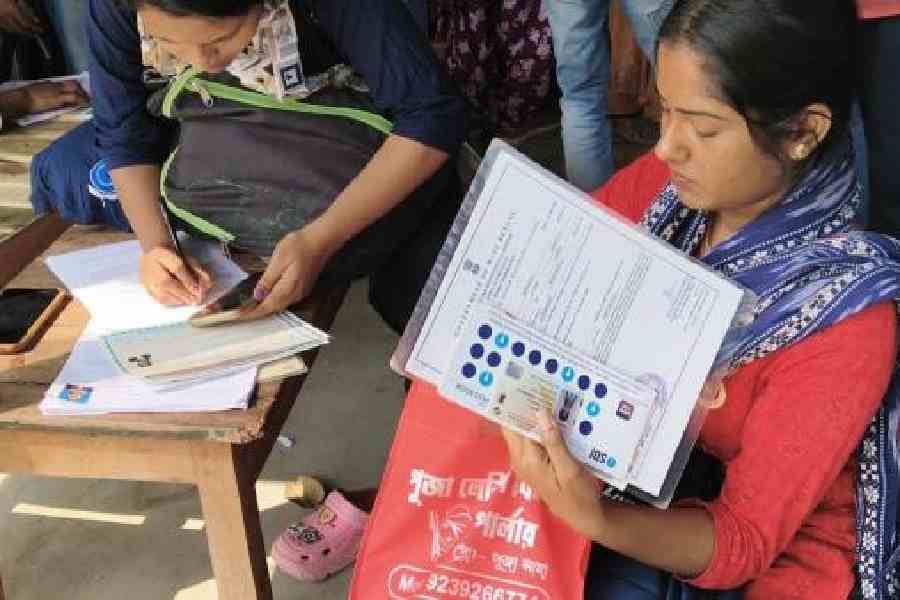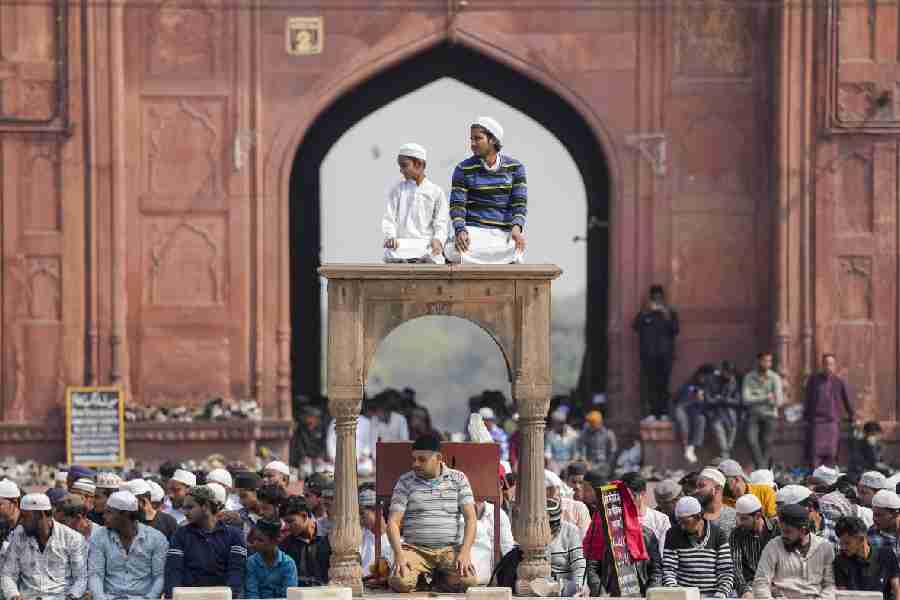Breakfast is believed to be the most important meal of the day, and in winter, it takes on an even greater significance. While winter might coax you to stay cosy and warm under the quilt, Calcutta’s winter mornings have a special charm of their own, especially when it comes to breakfast. There’s a certain legacy attached to the winter breakfast scene here that has been passed down through generations. So make the most of it while the nip is still in the air.
For me, breakfast has always had a special meaning, one that began during my college days at St. Xavier’s. With classes starting at an ungodly hour of 6am, my mornings were a mix of either scrambling to attend lectures or savouring those peaceful moments at various breakfast hubs. These spots hold a nostalgic place in my heart, a memory stretching back almost 25 years. They have remained unchanged — still as popular as they were two decades ago. It’s almost as if the essence of those early mornings has been preserved in the very air of Calcutta.
Sufia and Bombay Hotel
Since childhood, I’ve always had a soft spot for biryanis and chicken. Morning, evening, didn’t matter when, a potful of biryani was always a good idea. But finding biryanis and chicken in the early morning hours wasn’t exactly easy. That’s when my search led me to niharis and, soon enough, Sufia and Bombay Hotel became my go-to spots for a hearty plate of beef nalli nihari, dal puri, and naan rotis.
The century-old Sufia on Zakaria Street was once a spot for the descendants of Wajid Ali Shah. And soon it became a favourite of mine. Inscribed on its age-old metal placard, the dull paint coat of Sufia is easy to miss if one isn’t looking for it, but, even today it serves the same flavour that had won my heart almost 25 years back!
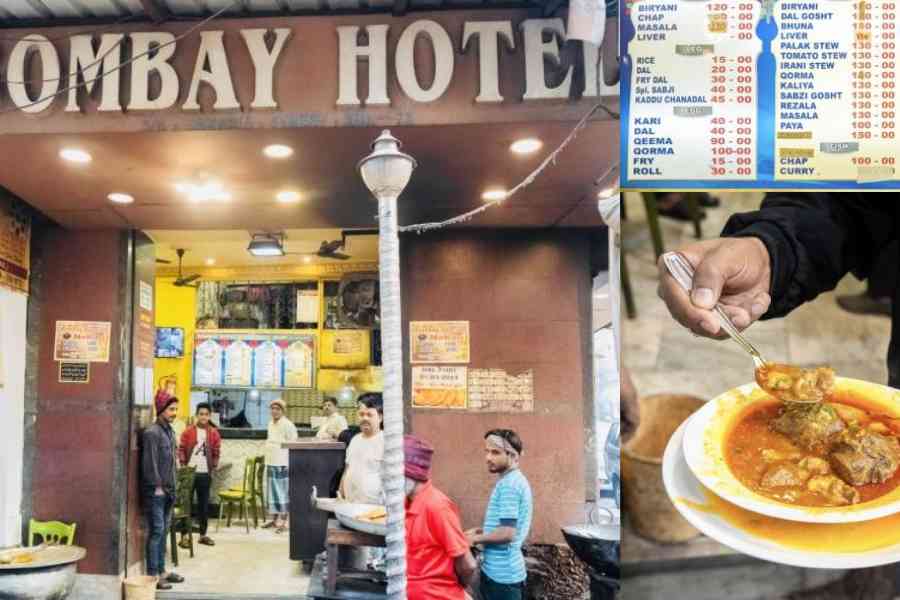
A similar finding to this was Bombay Hotel of Burra Bazar, tucked away against the backdrop of the bustling crowd. Still standing tall in its simplicity is the menu hanging from the chipped walls. I walk in squinting my eyes to find my childhood favourites like the stew, dal puri with sabzi gosht, and, to my surprise, the waiter walks to my table with the exact same aroma of spices that once perfected my winter breakfasts!
Kona Dukan
As you walk through the winding lanes of Dalhousie’s ‘Share Market’ area, squeezed into a corner lies the nearly 80-year-old Kona Dukan in a neighbourhood echoing Calcutta’s colonial past. I was always somewhat repulsed by milk and, during those times, milk was the only thing that breakfast spots were serving brimming hot for the winter chill. For me, finding an alternative was impossible till one day a friend took me on my Yezdi bike, bunking early morning classes, to this little culinary haven.
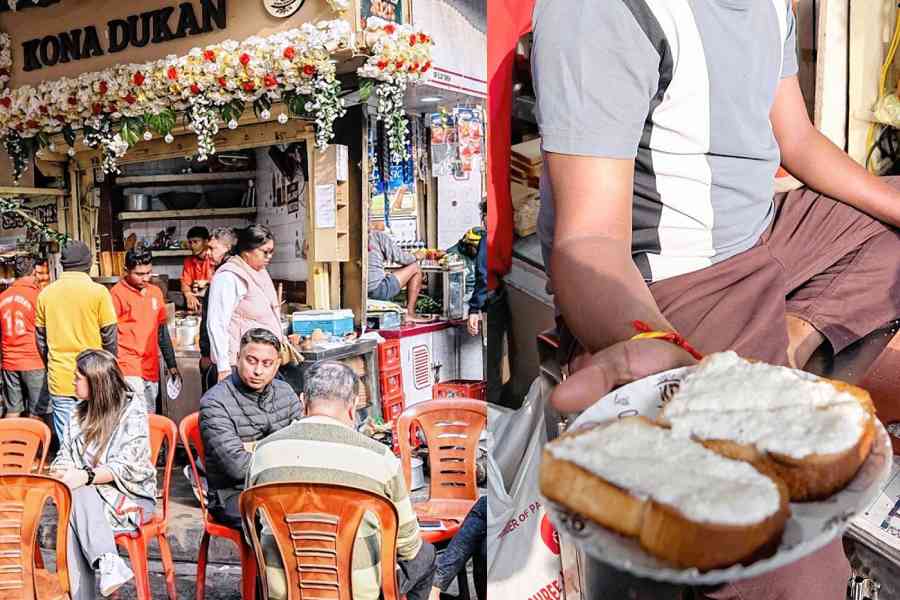
Even today, my senses fill up looking at that last slather of thick, rich malai on a perfectly crusted bun. A proud ‘tea’totaller, I blame Kona Dukan for making dudh-chaa so unique that a sip of it can make me wonder ‘is it fair to deprive myself from something so good?’.
Putiram
Putiram is one name that lingers in the mouth of almost any foodie who has got a weakness for the quintessential winter breakfast of stuffed, fluffy kochuris (stuffed bread) with either chholar dal (chick pea lentil) or aloo-r torkari (mashed potato in thick gravy). But my weakness for Putiram dates back to a time when I used to go to Bowbazar, where my mama bari is. Our days were spent swimming in College Square when I came across this 150-year-old culinary gem.
Even during the winters, when swimming was stopped, I would find a way to sneak out of my house just to indulge in those countless orders of crispy kochuri stuffed with biulir dal and aloo-r torkari made with potatoes with their skin intact! These days, we keep finding many refined forms of aloo-r dom, but ask any Bangali from my time, and they will tell you that an unpeeled (khosha na chharano) aloo-r dom has an additional flavour to the gravy.
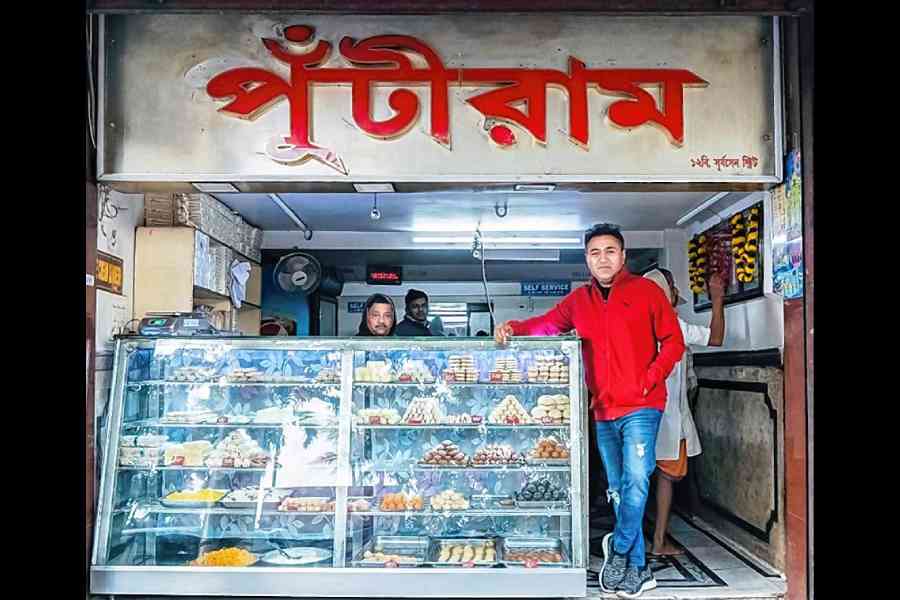
Two other interesting items were the Hati Sandesh and the Hansh Sandesh (sweets shaped like an elephant and a duck, respectively, made of khowa kheer) that still taste exactly the same since the time when I was a baby.
Adi Haridas Modak
My encounter with this tiny breakfast den traces back to times when we would bunk college for a little food expedition, only to find that we were running out of petrol. But a foodie’s heart is a truly dedicated one and someway or the other, we would squeeze ourselves into a swarmed-up Metro, landing in the paradise of sweets: Shyambazar!
Right at the five point-crossing of Shyambazar is Adi Haridas Modak. Set up with sharable seats, one, if lucky enough, would share their table with a celebrity as an addition, or simply would please their heart with their overtly delicious hing kochuri and chholar dal but with an additional unpeeled diced potato in it (probably the only place serving chholar dal with aloo).
What pleases me is that even today they hold the same tradition of serving these items on banana leaves. And, once your belly is full, don’t forget to try their sandesh and sweets like Pantua, Gur-er Rosogolla, Khirkodom, and so on.
National Economic Restaurant
True to its name, this is quite economic, serving a plate of buttered toast and an egg poach at ₹16 only! This ancient establishment, dating back to the 1920s, is right adjacent to the Shyambazar five-point crossing, three stores away from Haridas Modak.
Even today, you can witness a long queue just for its toast and poach. Almost like a picture out of a black-and-white Uttam Kumar film, you might even come across some of the old customers reading a newspaper for hours over a plate of poach and toast — a sight once common in the Bengal of the ’80s or even earlier.
Calcutta today has become a busy city, but once you land up in National Economic Restaurant, a sight similar to this brings out the real essence of North Calcutta steeped in the luxury of the ‘art of doing nothing!’ and chilling out without the worries of the fleeting time.
Blue Sky Cafe
Located in Sudder Street, Blue Sky Cafe is a popular spot among tourists and locals alike. The area, known for its budget accommodations and travel agencies, naturally attracts a mix of backpackers and is known to be a food hub of the hippie community coming from different parts of the world to explore Bengal and beyond.
Back in college, this cafe was the go-to place for a few Xaverians because of their pocket-friendly meals. During the winter, I remember often ending up at Sudder Street with a plate of chicken cheese omelette or chicken sausages after that tedious walk from college. The cafe also became a meeting ground to exchange stories with travellers from all corners of the globe.
Today, if you go there, the price still remains affordable with a wide range of cuisine inspired by and for these international travellers. In fact, you might even find a menu card which has items written in international languages alongside the generic English. And for a winter breakfast, do add my new favourite: the Mushroom Burger (a unique find at just ₹180) alongside some chocolate pancakes!
Rao’s Udipi Home
My first introduction to South Indian food happened right here, in this 55-year-old restaurant on Southern Avenue. Decked in minimalistic style, with seating arrangement of plastic tools and tables that mimics the typical morning chilled out adda vibe of any local cafe of the South, Rao’s Udipi Home remains house-full every single day, throughout the season, even at 10 in the morning. Rightly so, because, other than the lunch and evening snacks, this restaurant has been consistent in their preparation of dosas, vadas and idlis.
Many say that A.P.J. Abdul Kalam, during his visit to the city, had been pakced food from Rao’s Udipi. It has also been frequented by many famous faces like Vidya Balan. But to me, it is not about the popularity but about the taste from childhood that keeps me coming back every time!
Radhu Babu
This name has almost become a landmark in the field of heritage eateries and rightly so. Dating back to the 1930s, founded by a freedom fighter named Radhu Dutta, it is not just any shop but history itself! I have many friends and acquaintances who never begin their office regimen without stopping by Radhu Babu for a cup of tea every morning! Radhu Babu holds a special place in my heart. During my childhood, I would go to Vivekananda Park to play football and, while returning, it was a must to stop by and gorge on some butter toast with some soft egg poach. Even today, they remain a name among the South Calcutta eateries with their generous servings of butter on that golden, crisped-up bun.
Chinese Breakfast at Tiretti Bazar
No article on winter breakfast in Calcutta can come to fruition without the mention of a typical Chinese breakfast in Tiretti Bazar. During my college days, I had made many Chinese friends from Bowbazaar and their parents had shops in the Tiretti Bazaar area. My first encounter with Fish Bowl Soup and Pork Bao happened through them. I remember many winter mornings were spent riding straight to this place from home and trying out that steaming bowl of noodle soup. The warm slurp followed by the filling noodle was all I needed to energise myself to last the next half of my classes.
Very few would consider Chinese to begin their morning regimen. So, the market is now on the decline and, I fear, will disappear gradually, but it gives me so much happiness that still the legacy of a wonderful Chinese breakfast reigns in the heart of the city. I would urge everyone to grab on to this season and give it a try, only to find that there could be no substitute to a wonderful Chinese breakfast for a change.
Satyajit Ray or Ritwik Ghatak, East Bengal or Mohan Bagan, cinema or theatre, if you ever pass by these perpetual debates around the street, know that you have landed in Calcutta. Since time immemorial, these debates have been the very crux of the intellectual Bangalis and their cultural hybridisation. But one thing that has remained constant ever since the very inception of Calcutta is the winter breakfast.
There were times when Sundays meant a dive into seven kachoris at a time with sitabhog or jilipi. I am fortunate enough to say that life has served so much on my plate. It’s sometimes like a dream to witness myself live the very exact life that I aspired to have. But like any good thing, it came at the cost of letting certain things go. A hopeful heart knows to let go of them gracefully, but I have always been stubborn since childhood. And adding the overindulgent appetite for all things tasty, one thing I snatched back are the treasure troves that stand under the shabby roofs, behind creaking doors and on chipped walls, that are the glitz and glamour of my tilottoma, my city, Calcutta!
Debaditya Chaudhury is an entrepreneur who owns brands like Chowman, Oudh 1590 & Chapter 2. He is also a musician and the keyboardist of popular Bangla Rock band, Lakkhichhara

